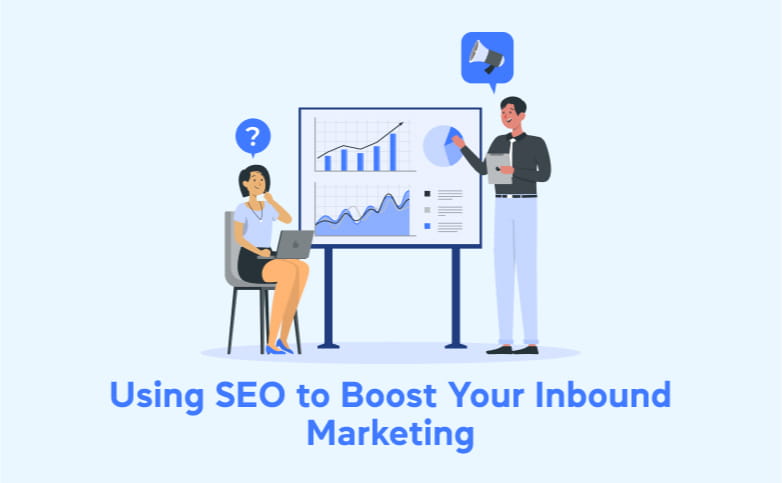Using SEO to Boost Your Inbound Marketing: Actionable Tips for SMEs
Looking to generate more inbound leads, grow revenue and increase conversions? Maybe it’s time to reexamine your inbound marketing strategy.
Inbound marketing involves subtlety, finesse and a healthy dose of SEO. In fact, good inbound marketing will be inextricably entwined with your SEO strategy.
Getting your inbound and your SEO working in concert can be a little tricky, but we’re here to show you how to leverage your SEO to bolster your inbound marketing.
What is Inbound Marketing?
In traditional or “outbound” marketing, you interrupt your audience in the middle of something they’re doing to show them your promotional messages. This doesn’t work very well when you’re using digital media because people can just switch channels or block your ads if they don’t like them. If executed poorly, your digital outbound marketing can be simply invisible or, at worst, intrusive and off-putting for potential customers.
Inbound marketing, on the other hand, is less intrusive and is designed to promote your brand and appeal to people who are already actively looking for your products or services.
Inbound marketing focuses on creating value-packed content to attract and engage potential customers, making it easy for them to see the value, evaluate options and become paying customers. Unlike outbound marketing, the customer makes the first contact.
The importance of inbound marketing cannot be overstated. Because it is aimed at drawing in customers who are already interested in your products or services, it’s targeted to potential clients with a high purchase intent.
These customers begin by searching for information, products or services they’re interested in. Your SEO and inbound strategy should be designed to capture that interest, demonstrate your expertise and turn that interest into a purchase.
Besides the focus on high-value customers, inbound marketing is also quantifiable with analytics available to help you fine tune your strategy. It’s also cheaper than outbound marketing and much more targeted.
Now that we have a sense of the value of outbound marketing, let’s look at how SEO plays its part.
Why Inbound Marketing Needs SEO

Organic SEO is a crucial part of any inbound marketing strategy and informative and high-quality content is the cornerstone of this strategy. But even the best content will not generate leads if nobody sees it. Around 7.5 million blog posts are published every single day, so simply creating and posting content is not enough. You also need to put it where your customers are looking. This is where SEO enters the picture.
SEO enhances the visibility and ranking of the content on search engine results pages (SERPs), so more people can discover it, engage with it, and if they want, get in touch with your business. Using SEO in tandem with inbound marketing, you can significantly improve the results of your inbound efforts.
SEO is a major factor in capturing audience intent. Inbound marketing aims to provide valuable content that aligns with the audience’s needs and interests. On the other hand, SEO targets specific keywords and phrases that users are actively searching for. By combining these approaches, you can identify relevant keywords that resonate with your target audience and create content that addresses their queries effectively.
This approach is designed to deliver long-term benefits, creating lasting relationships with customers and promoting brand loyalty. SEO, when implemented correctly, can drive organic traffic over time, extending the lifespan and reach of your content. Integrating SEO into your inbound marketing strategy ensures that your valuable content continues to attract potential customers long after it’s published.
Both inbound marketing and SEO provide valuable data to measure your efforts’ effectiveness. While inbound marketing metrics include lead generation and customer engagement, SEO metrics encompass keyword rankings, organic traffic, and bounce rates. By monitoring and analysing these metrics together, you can refine your strategies and achieve better overall performance.
Actionable SEO Strategies for Strengthening Inbound Marketing

First and foremost, you need to have your basic SEO work sorted out to lay the groundwork for your inbound marketing.
Do Some Keyword Research

Effective keyword research forms the foundation of successful SEO and inbound marketing. Use keyword research tools like Google Keyword Planner, SEMrush, or Ahrefs to identify relevant keywords and phrases related to your industry, products, or services. Choose keywords that reflect customer intent and align them with your content creation efforts.
Infuse Keyword into Content
Once you’ve identified your target keywords, optimise your content to rank higher on search engines. Incorporate the chosen keywords naturally into your blog posts, articles, and landing pages. But remember, prioritise providing value to your audience over keyword stuffing, as quality content leads to better engagement and higher chances of ranking.
Write Compelling Meta Tags
Craft enticing title tags and meta descriptions for your web pages. These elements are what users see on the SERPs, influencing their decision to click through to your website. Include your primary keyword and a compelling call-to-action to entice users to visit your site.
Create a Mobile-Friendly Design

With an increasing number of users accessing the internet on mobile devices, having a mobile-friendly website is crucial for both SEO and user experience. A responsive design ensures that your site adapts to different screen sizes, enhancing engagement and decreasing bounce rates.
Dip Your Toes into Link Building
Building high-quality backlinks from reputable websites is an essential SEO tactic that also benefits inbound marketing. Engage in guest posting, influencer outreach, and content promotion to increase the visibility and credibility of your content, ultimately attracting more potential customers.
Use Local SEO
If you have a physical business location, leverage local SEO strategies to reach nearby customers. Claim and optimise your Google My Business profile, list your business in local directories, and encourage customer reviews to improve your local search presence.
Monitor Analytics

Regularly analyse your website’s performance and inbound marketing efforts using tools like Google Analytics. Track the sources of your traffic, the most popular content, and conversion rates. Use these insights to refine your SEO and inbound marketing strategies continually.
Premium Strategies for enhancing your inbound
Once you have your general SEO in order, it’s time to start focusing on some of the inbound strategies that will really draw in leads and help you to capitalise on the work that your organic SEO is doing.
Use content to highlight expertise & present solutions
Content creation is where you get to showcase your brand’s expertise and present the information and solutions that your clients are searching for. It’s not enough to just create generic SEO content. Once your prospective clients have your content in front of them you need to make the most of that opportunity. Rather than presenting a pushy sales pitch, your content needs to show your expertise, experience and authority in a way that is useful for clients.
This content may be long form blogs, how-to guides and manuals, pictorial guides, videos, podcasts or any other digital content that offers some benefits to your clients. It’s essential to remember that this content is not explicit marketing material, but rather free material that is useful to your customers.
Automate website guidance
Adding a non-intrusive and useful chatbot to your website is an easy way to bolster your inbound strategy. It can help to provide customers with guidance when they land on your site. It can also help to guide customers through the sales funnel, increasing the likelihood of generating a sale or a lead.
Make the most of Social media
Maintaining an active social media presence is another great inbound strategy. Social media channels are yet another opportunity to showcase your expertise and authority, as well as providing additional contact channels that facilitate one-on-one interactions with clients.
Be Unstoppable
Integrating SEO into your inbound marketing strategy can significantly enhance your online visibility, drive organic traffic, and attract high-quality leads. Imagine a widespread circle of customers continuously homing on to your content pages and sales pages. That’s what SEO can do. If you have valuable content and your inbound sales funnel is designed correctly, nothing can stop your sales from increasing.








